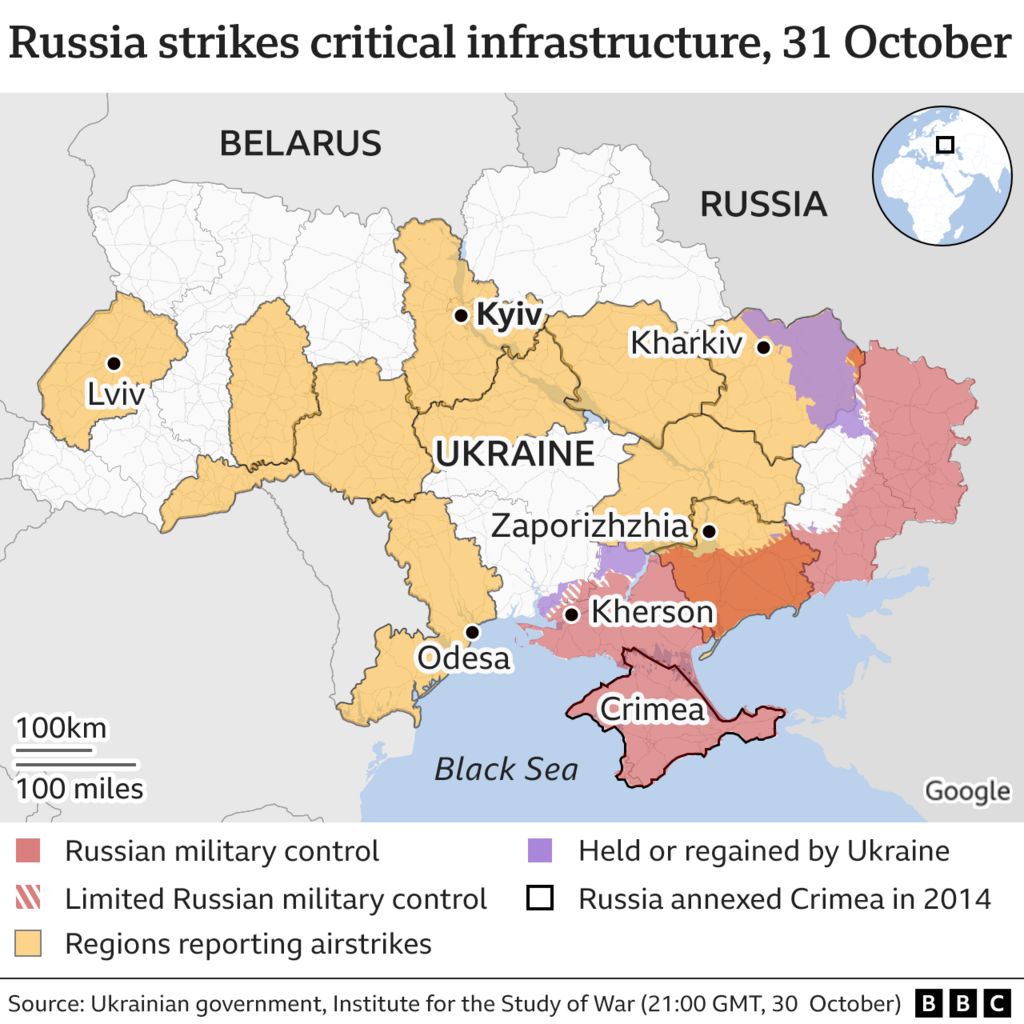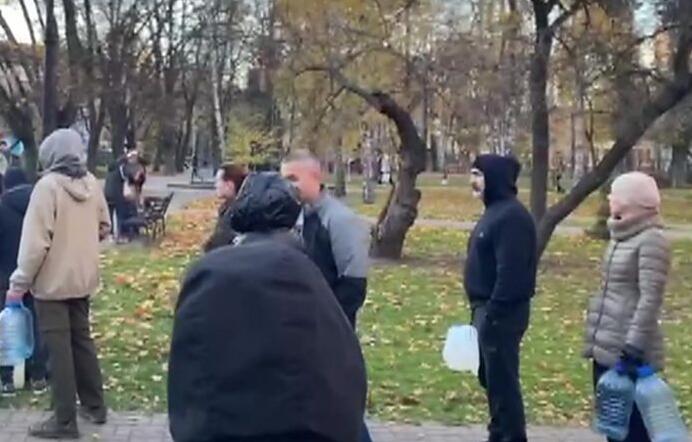Ukraine war: Kyiv locals queue for water after Russian strikes
People in the Ukrainian capital, Kyiv, had to queue for water after Russian missiles struck key facilities across the country on Monday.
An evening update from the city’s mayor, Vitaliy Klitschko, said 40% of consumers in Kyiv remained without water and 270,000 homes had no power.
Thirteen people were injured in the attacks nationwide, Ukraine said.
Russia said the strikes were aimed at Ukraine’s military control and energy systems and that all targets were hit.
They were partly in response to an attack on a Russian warship over the weekend, Russian President Vladimir Putin said on Monday.
In its evening update, the Ukrainian military said it had shot down 45 out of 55 missiles that were launched.
For security reasons, the outside world is rarely shown the destruction of Ukraine’s critical infrastructure by Russian airstrikes.
Ukrainian officials say this is to avoid sharing information that could be used in future attacks, including locations hit – or potentially missed.
But the consequences of Monday’s strikes were everywhere to be seen. Rolling power cuts have been introduced in several regions.
Ukrainians in general have been urged to reduce what is already an “extremely frugal” electricity consumption, in the words of President Volodymyr Zelensky.
In Kyiv, street lights were turned off and trolleybuses replaced with conventional buses.
Long queues were seen across the city as residents lined up to collect water from pumps after their own supplies were cut.
As many as 80% of Kyiv’s consumers were said to have been left without running water in the immediate aftermath of the attacks.
Later, Mr Zelensky said in his evening address that work was continuing to reconnect households with their services.
Russia did not have the missiles to destroy “the Ukrainian will to live”, he added in a defiant message.
In addition to the capital, other areas affected by the strikes included Lviv, Dnipropetrovsk, Kharkiv and Zaporizhzia.
Overall, 18 facilities – most of them energy-generating – were hit by missiles and drones in 10 regions, Ukrainian officials said.
One of the missiles intercepted by Ukraine’s air defences landed in a border town in Moldova, causing damage to houses but no casualties, according to authorities in the neighbouring country.
Moldova later said a Russian embassy employee in Chisinau had been told to leave its territory, without specifying who the individual was.

Monday’s strikes came after Russia blamed Ukraine for a drone attack on its Black Sea Fleet in the annexed Crimean peninsula over the weekend – a matter on which Kyiv has not commented.
Answering reporters’ questions on Monday evening, President Putin confirmed that the strikes were partly intended as a retaliation.
He also said Russia had suspended, but not ended, its participation in a UN-brokered deal which allows safe passage to ships carrying grain from Ukrainian ports, although Ukraine said earlier on Monday that ships were continuing to depart, despite Russia’s withdrawal from the deal.
The fresh wave of attacks was the latest example of what has become Russia’s strategy in Ukraine: the targeting of the important infrastructure before winter, when temperatures can drop to -20C.
Ukraine says this is Russia’s response to its military defeats, as the Ukrainian army takes back territory in a successful counter-offensive.
Ukrainian defence minister Oleksii Reznikov has linked the Russian campaign to Gen Sergei Surovikin, who was appointed by President Putin as his new commander in Ukraine earlier this month.
In a rare news conference last week, the minister said Russian forces had “changed their tactics” after the arrival of Gen Surovikin – whose nickname is Gen Armageddon – and “started openly fighting with the civilian population, not with the armed forces of Ukraine”.
The goal, he said, was to inflict “chaos and panic” in the population, “when it’s very cold and dark”.
President Zelensky has described this tactic as “terrorism”. Many Ukrainians say they are not afraid, though many are angry that civilians have again become the target.
Western leaders, including European Commission President Ursula von der Leyen, have recently pointed out that deliberate strikes on key civilian infrastructure would constitute war crimes under treaties that define the “rules” of war, known as the Geneva Conventions. Moscow, however, denies culpability for any war crimes.
“Instead of fighting on the battlefield, Russia fights civilians,” Dmytro Kuleba, the Ukrainian foreign minister, said on Monday morning – echoing a view shared by many of his compatriots.
Ukraine says it needs more air defence capabilities to defend its cities. Germany has already sent equipment, while the UK and the US have announced they will do so.
